Regulations, Ethics, and Legislations in Travel and Tourism Sector
VerifiedAdded on 2020/10/05
|13
|4830
|127
Report
AI Summary
This report delves into the legislations and ethics governing the travel and tourism sector. It begins with an overview of the legal and regulatory frameworks within the English law system, examining both civil and criminal laws, as well as the roles of customs, common law, and statute law. The report further explores the roles of various regulatory bodies, such as ABTA and the International Civil Aviation Organization, and international conventions impacting surface, sea, and air transport. It then analyzes health, safety, and security legislations, including the Health and Safety Act and the Data Protection Act, and their implications for businesses like the Elegant Hotel. The report also examines equality regulations within the English legal system, emphasizing the Equality Act 2010. Finally, it addresses consumer protection legislation and ethical dimensions within the corporate sector, including corporate social responsibility.
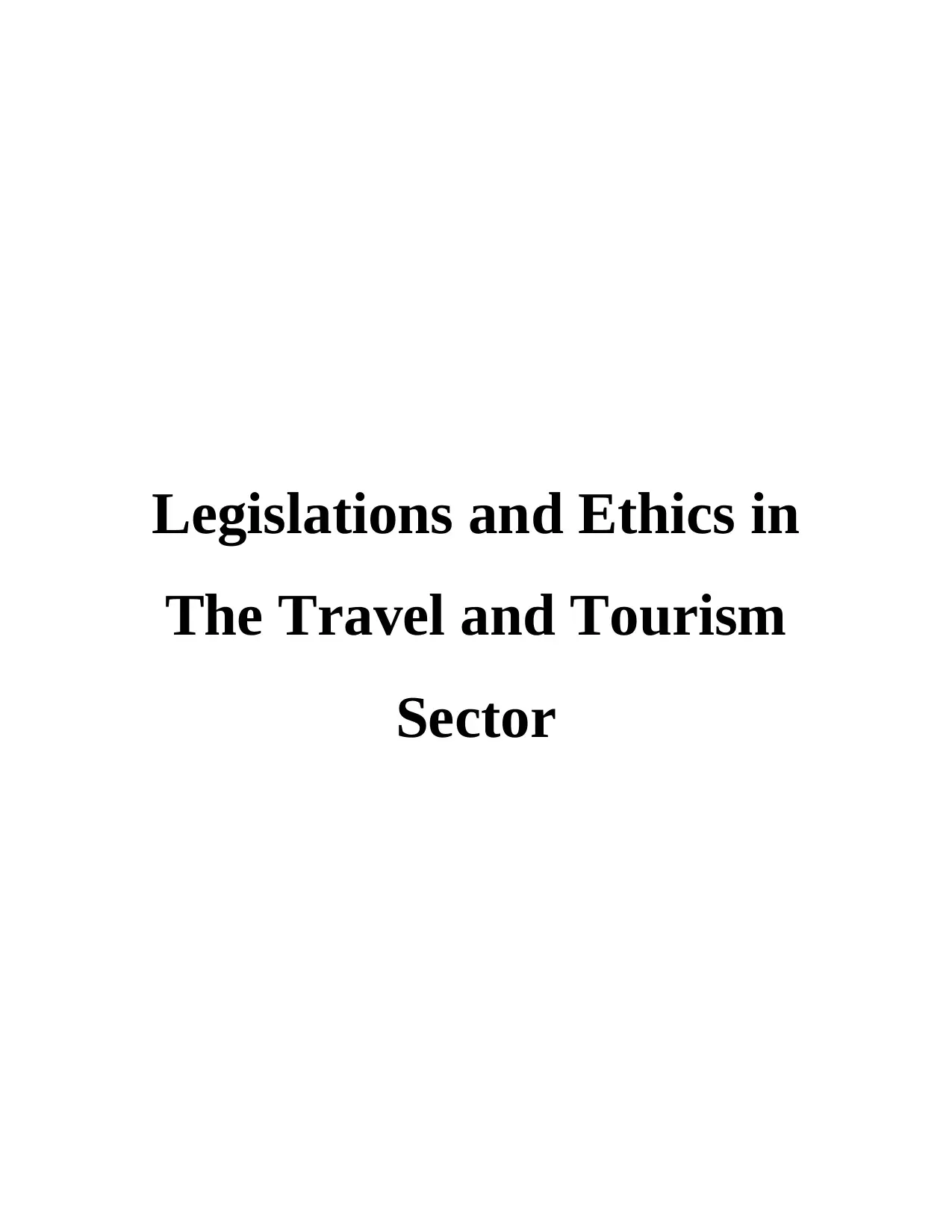
Legislations and Ethics in
The Travel and Tourism
Sector
The Travel and Tourism
Sector
Paraphrase This Document
Need a fresh take? Get an instant paraphrase of this document with our AI Paraphraser
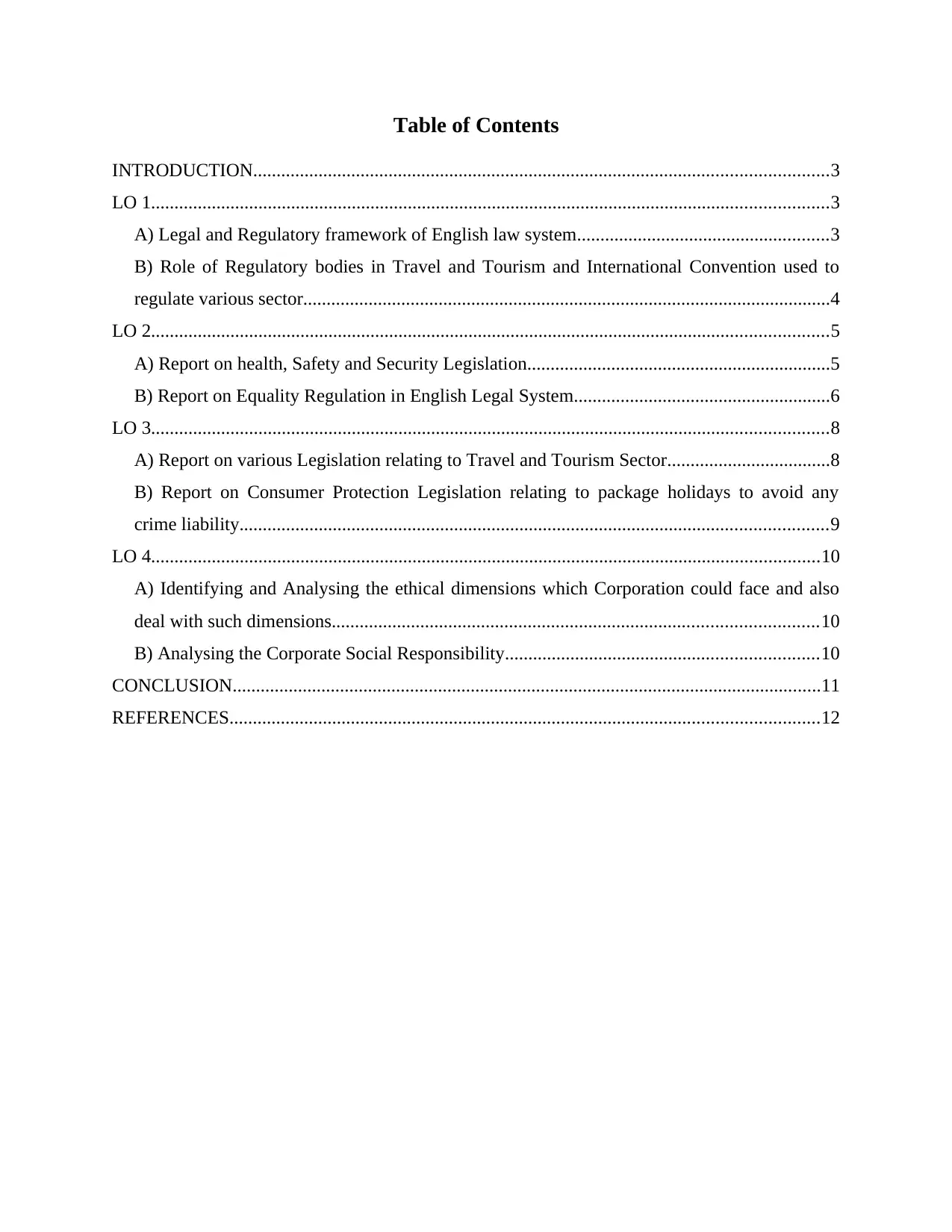
Table of Contents
INTRODUCTION...........................................................................................................................3
LO 1.................................................................................................................................................3
A) Legal and Regulatory framework of English law system......................................................3
B) Role of Regulatory bodies in Travel and Tourism and International Convention used to
regulate various sector.................................................................................................................4
LO 2.................................................................................................................................................5
A) Report on health, Safety and Security Legislation.................................................................5
B) Report on Equality Regulation in English Legal System.......................................................6
LO 3.................................................................................................................................................8
A) Report on various Legislation relating to Travel and Tourism Sector...................................8
B) Report on Consumer Protection Legislation relating to package holidays to avoid any
crime liability..............................................................................................................................9
LO 4...............................................................................................................................................10
A) Identifying and Analysing the ethical dimensions which Corporation could face and also
deal with such dimensions........................................................................................................10
B) Analysing the Corporate Social Responsibility...................................................................10
CONCLUSION..............................................................................................................................11
REFERENCES..............................................................................................................................12
INTRODUCTION...........................................................................................................................3
LO 1.................................................................................................................................................3
A) Legal and Regulatory framework of English law system......................................................3
B) Role of Regulatory bodies in Travel and Tourism and International Convention used to
regulate various sector.................................................................................................................4
LO 2.................................................................................................................................................5
A) Report on health, Safety and Security Legislation.................................................................5
B) Report on Equality Regulation in English Legal System.......................................................6
LO 3.................................................................................................................................................8
A) Report on various Legislation relating to Travel and Tourism Sector...................................8
B) Report on Consumer Protection Legislation relating to package holidays to avoid any
crime liability..............................................................................................................................9
LO 4...............................................................................................................................................10
A) Identifying and Analysing the ethical dimensions which Corporation could face and also
deal with such dimensions........................................................................................................10
B) Analysing the Corporate Social Responsibility...................................................................10
CONCLUSION..............................................................................................................................11
REFERENCES..............................................................................................................................12
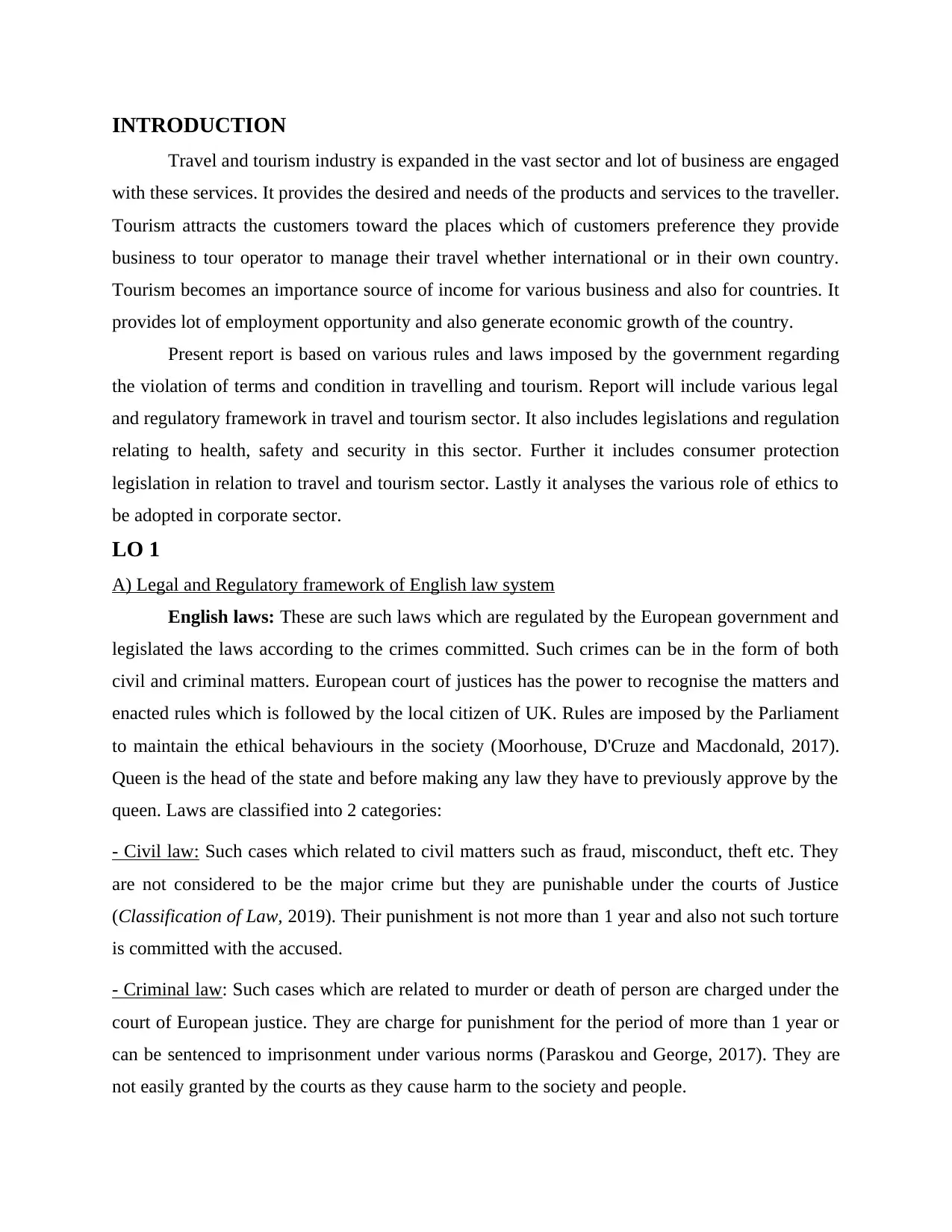
INTRODUCTION
Travel and tourism industry is expanded in the vast sector and lot of business are engaged
with these services. It provides the desired and needs of the products and services to the traveller.
Tourism attracts the customers toward the places which of customers preference they provide
business to tour operator to manage their travel whether international or in their own country.
Tourism becomes an importance source of income for various business and also for countries. It
provides lot of employment opportunity and also generate economic growth of the country.
Present report is based on various rules and laws imposed by the government regarding
the violation of terms and condition in travelling and tourism. Report will include various legal
and regulatory framework in travel and tourism sector. It also includes legislations and regulation
relating to health, safety and security in this sector. Further it includes consumer protection
legislation in relation to travel and tourism sector. Lastly it analyses the various role of ethics to
be adopted in corporate sector.
LO 1
A) Legal and Regulatory framework of English law system
English laws: These are such laws which are regulated by the European government and
legislated the laws according to the crimes committed. Such crimes can be in the form of both
civil and criminal matters. European court of justices has the power to recognise the matters and
enacted rules which is followed by the local citizen of UK. Rules are imposed by the Parliament
to maintain the ethical behaviours in the society (Moorhouse, D'Cruze and Macdonald, 2017).
Queen is the head of the state and before making any law they have to previously approve by the
queen. Laws are classified into 2 categories:
- Civil law: Such cases which related to civil matters such as fraud, misconduct, theft etc. They
are not considered to be the major crime but they are punishable under the courts of Justice
(Classification of Law, 2019). Their punishment is not more than 1 year and also not such torture
is committed with the accused.
- Criminal law: Such cases which are related to murder or death of person are charged under the
court of European justice. They are charge for punishment for the period of more than 1 year or
can be sentenced to imprisonment under various norms (Paraskou and George, 2017). They are
not easily granted by the courts as they cause harm to the society and people.
Travel and tourism industry is expanded in the vast sector and lot of business are engaged
with these services. It provides the desired and needs of the products and services to the traveller.
Tourism attracts the customers toward the places which of customers preference they provide
business to tour operator to manage their travel whether international or in their own country.
Tourism becomes an importance source of income for various business and also for countries. It
provides lot of employment opportunity and also generate economic growth of the country.
Present report is based on various rules and laws imposed by the government regarding
the violation of terms and condition in travelling and tourism. Report will include various legal
and regulatory framework in travel and tourism sector. It also includes legislations and regulation
relating to health, safety and security in this sector. Further it includes consumer protection
legislation in relation to travel and tourism sector. Lastly it analyses the various role of ethics to
be adopted in corporate sector.
LO 1
A) Legal and Regulatory framework of English law system
English laws: These are such laws which are regulated by the European government and
legislated the laws according to the crimes committed. Such crimes can be in the form of both
civil and criminal matters. European court of justices has the power to recognise the matters and
enacted rules which is followed by the local citizen of UK. Rules are imposed by the Parliament
to maintain the ethical behaviours in the society (Moorhouse, D'Cruze and Macdonald, 2017).
Queen is the head of the state and before making any law they have to previously approve by the
queen. Laws are classified into 2 categories:
- Civil law: Such cases which related to civil matters such as fraud, misconduct, theft etc. They
are not considered to be the major crime but they are punishable under the courts of Justice
(Classification of Law, 2019). Their punishment is not more than 1 year and also not such torture
is committed with the accused.
- Criminal law: Such cases which are related to murder or death of person are charged under the
court of European justice. They are charge for punishment for the period of more than 1 year or
can be sentenced to imprisonment under various norms (Paraskou and George, 2017). They are
not easily granted by the courts as they cause harm to the society and people.
⊘ This is a preview!⊘
Do you want full access?
Subscribe today to unlock all pages.

Trusted by 1+ million students worldwide
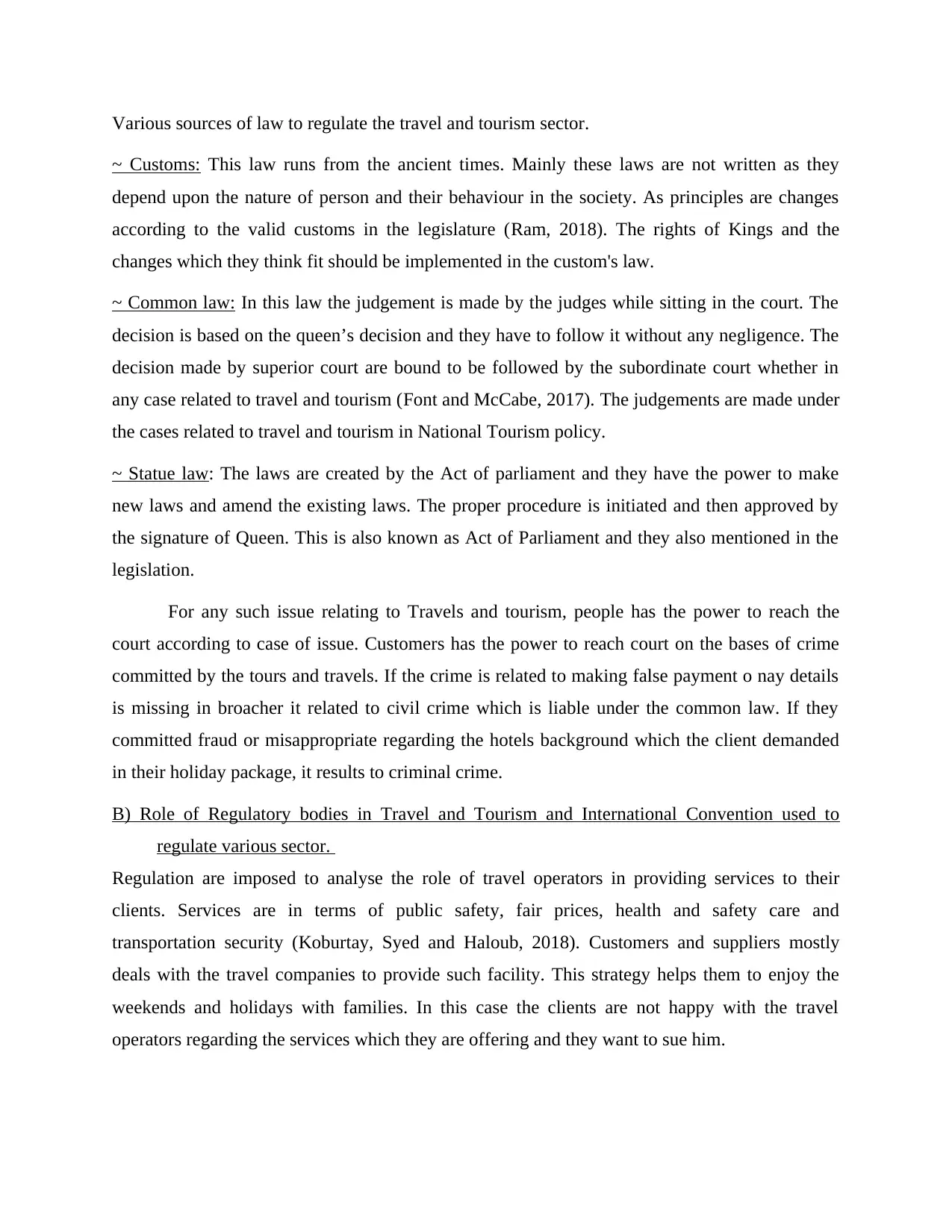
Various sources of law to regulate the travel and tourism sector.
~ Customs: This law runs from the ancient times. Mainly these laws are not written as they
depend upon the nature of person and their behaviour in the society. As principles are changes
according to the valid customs in the legislature (Ram, 2018). The rights of Kings and the
changes which they think fit should be implemented in the custom's law.
~ Common law: In this law the judgement is made by the judges while sitting in the court. The
decision is based on the queen’s decision and they have to follow it without any negligence. The
decision made by superior court are bound to be followed by the subordinate court whether in
any case related to travel and tourism (Font and McCabe, 2017). The judgements are made under
the cases related to travel and tourism in National Tourism policy.
~ Statue law: The laws are created by the Act of parliament and they have the power to make
new laws and amend the existing laws. The proper procedure is initiated and then approved by
the signature of Queen. This is also known as Act of Parliament and they also mentioned in the
legislation.
For any such issue relating to Travels and tourism, people has the power to reach the
court according to case of issue. Customers has the power to reach court on the bases of crime
committed by the tours and travels. If the crime is related to making false payment o nay details
is missing in broacher it related to civil crime which is liable under the common law. If they
committed fraud or misappropriate regarding the hotels background which the client demanded
in their holiday package, it results to criminal crime.
B) Role of Regulatory bodies in Travel and Tourism and International Convention used to
regulate various sector.
Regulation are imposed to analyse the role of travel operators in providing services to their
clients. Services are in terms of public safety, fair prices, health and safety care and
transportation security (Koburtay, Syed and Haloub, 2018). Customers and suppliers mostly
deals with the travel companies to provide such facility. This strategy helps them to enjoy the
weekends and holidays with families. In this case the clients are not happy with the travel
operators regarding the services which they are offering and they want to sue him.
~ Customs: This law runs from the ancient times. Mainly these laws are not written as they
depend upon the nature of person and their behaviour in the society. As principles are changes
according to the valid customs in the legislature (Ram, 2018). The rights of Kings and the
changes which they think fit should be implemented in the custom's law.
~ Common law: In this law the judgement is made by the judges while sitting in the court. The
decision is based on the queen’s decision and they have to follow it without any negligence. The
decision made by superior court are bound to be followed by the subordinate court whether in
any case related to travel and tourism (Font and McCabe, 2017). The judgements are made under
the cases related to travel and tourism in National Tourism policy.
~ Statue law: The laws are created by the Act of parliament and they have the power to make
new laws and amend the existing laws. The proper procedure is initiated and then approved by
the signature of Queen. This is also known as Act of Parliament and they also mentioned in the
legislation.
For any such issue relating to Travels and tourism, people has the power to reach the
court according to case of issue. Customers has the power to reach court on the bases of crime
committed by the tours and travels. If the crime is related to making false payment o nay details
is missing in broacher it related to civil crime which is liable under the common law. If they
committed fraud or misappropriate regarding the hotels background which the client demanded
in their holiday package, it results to criminal crime.
B) Role of Regulatory bodies in Travel and Tourism and International Convention used to
regulate various sector.
Regulation are imposed to analyse the role of travel operators in providing services to their
clients. Services are in terms of public safety, fair prices, health and safety care and
transportation security (Koburtay, Syed and Haloub, 2018). Customers and suppliers mostly
deals with the travel companies to provide such facility. This strategy helps them to enjoy the
weekends and holidays with families. In this case the clients are not happy with the travel
operators regarding the services which they are offering and they want to sue him.
Paraphrase This Document
Need a fresh take? Get an instant paraphrase of this document with our AI Paraphraser
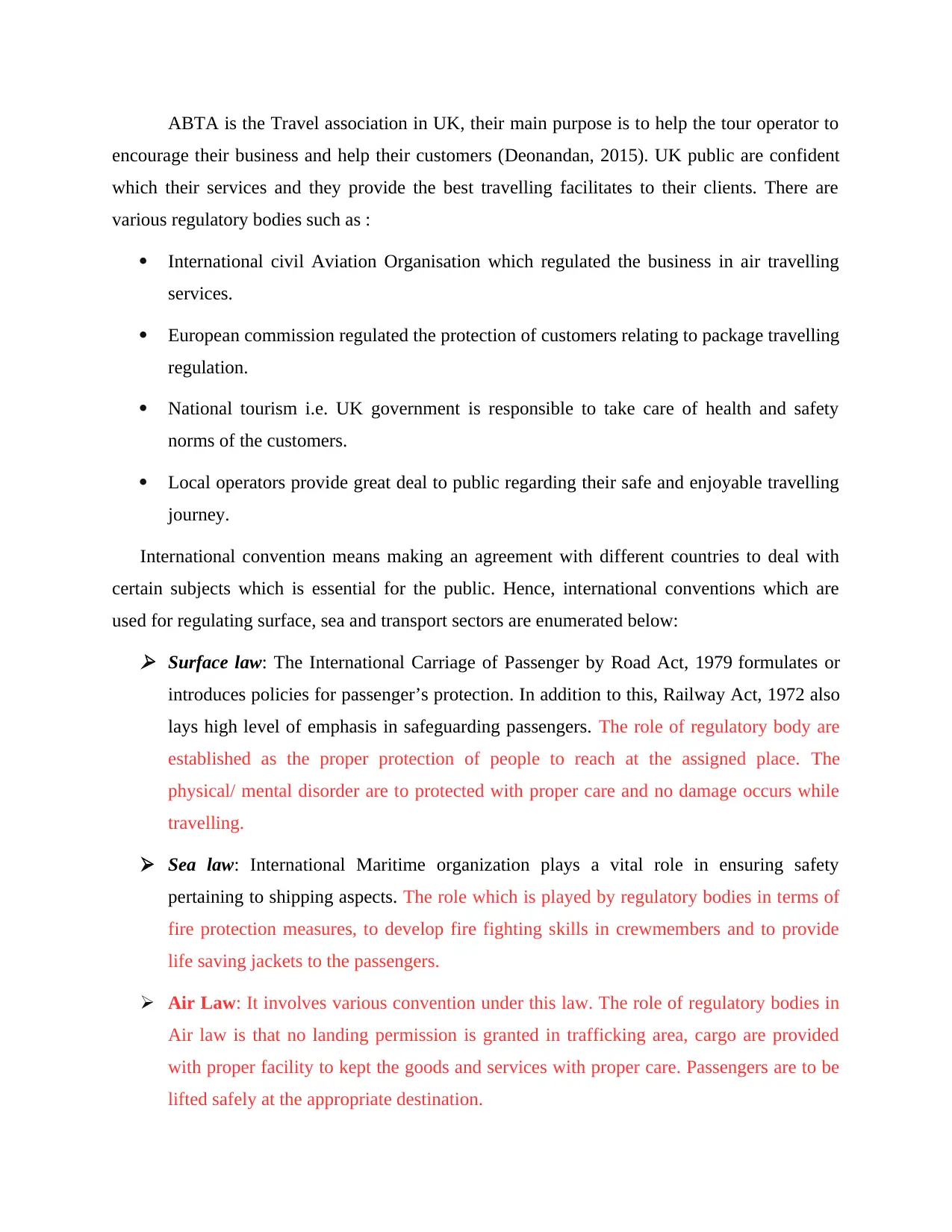
ABTA is the Travel association in UK, their main purpose is to help the tour operator to
encourage their business and help their customers (Deonandan, 2015). UK public are confident
which their services and they provide the best travelling facilitates to their clients. There are
various regulatory bodies such as :
International civil Aviation Organisation which regulated the business in air travelling
services.
European commission regulated the protection of customers relating to package travelling
regulation.
National tourism i.e. UK government is responsible to take care of health and safety
norms of the customers.
Local operators provide great deal to public regarding their safe and enjoyable travelling
journey.
International convention means making an agreement with different countries to deal with
certain subjects which is essential for the public. Hence, international conventions which are
used for regulating surface, sea and transport sectors are enumerated below: Surface law: The International Carriage of Passenger by Road Act, 1979 formulates or
introduces policies for passenger’s protection. In addition to this, Railway Act, 1972 also
lays high level of emphasis in safeguarding passengers. The role of regulatory body are
established as the proper protection of people to reach at the assigned place. The
physical/ mental disorder are to protected with proper care and no damage occurs while
travelling.
Sea law: International Maritime organization plays a vital role in ensuring safety
pertaining to shipping aspects. The role which is played by regulatory bodies in terms of
fire protection measures, to develop fire fighting skills in crewmembers and to provide
life saving jackets to the passengers.
Air Law: It involves various convention under this law. The role of regulatory bodies in
Air law is that no landing permission is granted in trafficking area, cargo are provided
with proper facility to kept the goods and services with proper care. Passengers are to be
lifted safely at the appropriate destination.
encourage their business and help their customers (Deonandan, 2015). UK public are confident
which their services and they provide the best travelling facilitates to their clients. There are
various regulatory bodies such as :
International civil Aviation Organisation which regulated the business in air travelling
services.
European commission regulated the protection of customers relating to package travelling
regulation.
National tourism i.e. UK government is responsible to take care of health and safety
norms of the customers.
Local operators provide great deal to public regarding their safe and enjoyable travelling
journey.
International convention means making an agreement with different countries to deal with
certain subjects which is essential for the public. Hence, international conventions which are
used for regulating surface, sea and transport sectors are enumerated below: Surface law: The International Carriage of Passenger by Road Act, 1979 formulates or
introduces policies for passenger’s protection. In addition to this, Railway Act, 1972 also
lays high level of emphasis in safeguarding passengers. The role of regulatory body are
established as the proper protection of people to reach at the assigned place. The
physical/ mental disorder are to protected with proper care and no damage occurs while
travelling.
Sea law: International Maritime organization plays a vital role in ensuring safety
pertaining to shipping aspects. The role which is played by regulatory bodies in terms of
fire protection measures, to develop fire fighting skills in crewmembers and to provide
life saving jackets to the passengers.
Air Law: It involves various convention under this law. The role of regulatory bodies in
Air law is that no landing permission is granted in trafficking area, cargo are provided
with proper facility to kept the goods and services with proper care. Passengers are to be
lifted safely at the appropriate destination.
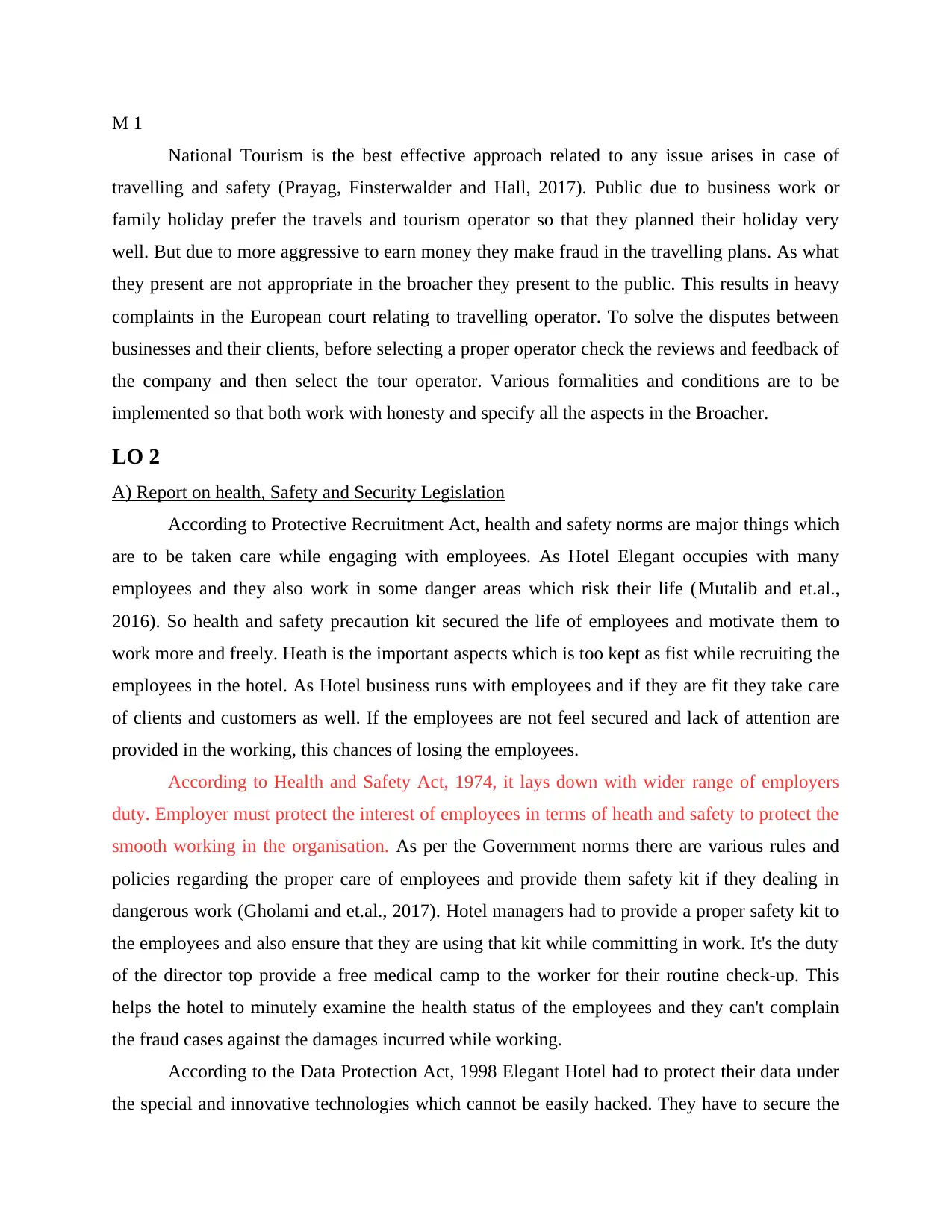
M 1
National Tourism is the best effective approach related to any issue arises in case of
travelling and safety (Prayag, Finsterwalder and Hall, 2017). Public due to business work or
family holiday prefer the travels and tourism operator so that they planned their holiday very
well. But due to more aggressive to earn money they make fraud in the travelling plans. As what
they present are not appropriate in the broacher they present to the public. This results in heavy
complaints in the European court relating to travelling operator. To solve the disputes between
businesses and their clients, before selecting a proper operator check the reviews and feedback of
the company and then select the tour operator. Various formalities and conditions are to be
implemented so that both work with honesty and specify all the aspects in the Broacher.
LO 2
A) Report on health, Safety and Security Legislation
According to Protective Recruitment Act, health and safety norms are major things which
are to be taken care while engaging with employees. As Hotel Elegant occupies with many
employees and they also work in some danger areas which risk their life (Mutalib and et.al.,
2016). So health and safety precaution kit secured the life of employees and motivate them to
work more and freely. Heath is the important aspects which is too kept as fist while recruiting the
employees in the hotel. As Hotel business runs with employees and if they are fit they take care
of clients and customers as well. If the employees are not feel secured and lack of attention are
provided in the working, this chances of losing the employees.
According to Health and Safety Act, 1974, it lays down with wider range of employers
duty. Employer must protect the interest of employees in terms of heath and safety to protect the
smooth working in the organisation. As per the Government norms there are various rules and
policies regarding the proper care of employees and provide them safety kit if they dealing in
dangerous work (Gholami and et.al., 2017). Hotel managers had to provide a proper safety kit to
the employees and also ensure that they are using that kit while committing in work. It's the duty
of the director top provide a free medical camp to the worker for their routine check-up. This
helps the hotel to minutely examine the health status of the employees and they can't complain
the fraud cases against the damages incurred while working.
According to the Data Protection Act, 1998 Elegant Hotel had to protect their data under
the special and innovative technologies which cannot be easily hacked. They have to secure the
National Tourism is the best effective approach related to any issue arises in case of
travelling and safety (Prayag, Finsterwalder and Hall, 2017). Public due to business work or
family holiday prefer the travels and tourism operator so that they planned their holiday very
well. But due to more aggressive to earn money they make fraud in the travelling plans. As what
they present are not appropriate in the broacher they present to the public. This results in heavy
complaints in the European court relating to travelling operator. To solve the disputes between
businesses and their clients, before selecting a proper operator check the reviews and feedback of
the company and then select the tour operator. Various formalities and conditions are to be
implemented so that both work with honesty and specify all the aspects in the Broacher.
LO 2
A) Report on health, Safety and Security Legislation
According to Protective Recruitment Act, health and safety norms are major things which
are to be taken care while engaging with employees. As Hotel Elegant occupies with many
employees and they also work in some danger areas which risk their life (Mutalib and et.al.,
2016). So health and safety precaution kit secured the life of employees and motivate them to
work more and freely. Heath is the important aspects which is too kept as fist while recruiting the
employees in the hotel. As Hotel business runs with employees and if they are fit they take care
of clients and customers as well. If the employees are not feel secured and lack of attention are
provided in the working, this chances of losing the employees.
According to Health and Safety Act, 1974, it lays down with wider range of employers
duty. Employer must protect the interest of employees in terms of heath and safety to protect the
smooth working in the organisation. As per the Government norms there are various rules and
policies regarding the proper care of employees and provide them safety kit if they dealing in
dangerous work (Gholami and et.al., 2017). Hotel managers had to provide a proper safety kit to
the employees and also ensure that they are using that kit while committing in work. It's the duty
of the director top provide a free medical camp to the worker for their routine check-up. This
helps the hotel to minutely examine the health status of the employees and they can't complain
the fraud cases against the damages incurred while working.
According to the Data Protection Act, 1998 Elegant Hotel had to protect their data under
the special and innovative technologies which cannot be easily hacked. They have to secure the
⊘ This is a preview!⊘
Do you want full access?
Subscribe today to unlock all pages.

Trusted by 1+ million students worldwide
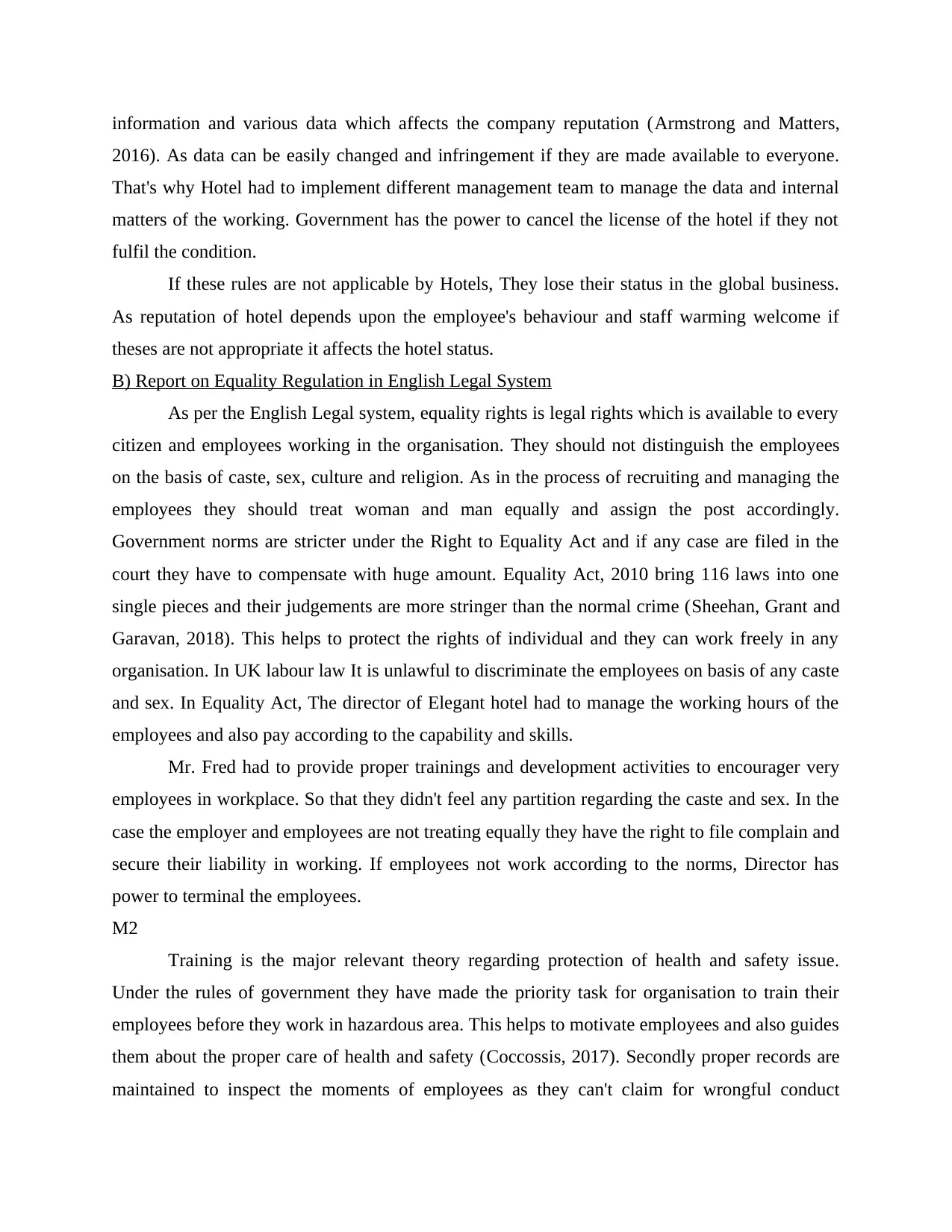
information and various data which affects the company reputation (Armstrong and Matters,
2016). As data can be easily changed and infringement if they are made available to everyone.
That's why Hotel had to implement different management team to manage the data and internal
matters of the working. Government has the power to cancel the license of the hotel if they not
fulfil the condition.
If these rules are not applicable by Hotels, They lose their status in the global business.
As reputation of hotel depends upon the employee's behaviour and staff warming welcome if
theses are not appropriate it affects the hotel status.
B) Report on Equality Regulation in English Legal System
As per the English Legal system, equality rights is legal rights which is available to every
citizen and employees working in the organisation. They should not distinguish the employees
on the basis of caste, sex, culture and religion. As in the process of recruiting and managing the
employees they should treat woman and man equally and assign the post accordingly.
Government norms are stricter under the Right to Equality Act and if any case are filed in the
court they have to compensate with huge amount. Equality Act, 2010 bring 116 laws into one
single pieces and their judgements are more stringer than the normal crime (Sheehan, Grant and
Garavan, 2018). This helps to protect the rights of individual and they can work freely in any
organisation. In UK labour law It is unlawful to discriminate the employees on basis of any caste
and sex. In Equality Act, The director of Elegant hotel had to manage the working hours of the
employees and also pay according to the capability and skills.
Mr. Fred had to provide proper trainings and development activities to encourager very
employees in workplace. So that they didn't feel any partition regarding the caste and sex. In the
case the employer and employees are not treating equally they have the right to file complain and
secure their liability in working. If employees not work according to the norms, Director has
power to terminal the employees.
M2
Training is the major relevant theory regarding protection of health and safety issue.
Under the rules of government they have made the priority task for organisation to train their
employees before they work in hazardous area. This helps to motivate employees and also guides
them about the proper care of health and safety (Coccossis, 2017). Secondly proper records are
maintained to inspect the moments of employees as they can't claim for wrongful conduct
2016). As data can be easily changed and infringement if they are made available to everyone.
That's why Hotel had to implement different management team to manage the data and internal
matters of the working. Government has the power to cancel the license of the hotel if they not
fulfil the condition.
If these rules are not applicable by Hotels, They lose their status in the global business.
As reputation of hotel depends upon the employee's behaviour and staff warming welcome if
theses are not appropriate it affects the hotel status.
B) Report on Equality Regulation in English Legal System
As per the English Legal system, equality rights is legal rights which is available to every
citizen and employees working in the organisation. They should not distinguish the employees
on the basis of caste, sex, culture and religion. As in the process of recruiting and managing the
employees they should treat woman and man equally and assign the post accordingly.
Government norms are stricter under the Right to Equality Act and if any case are filed in the
court they have to compensate with huge amount. Equality Act, 2010 bring 116 laws into one
single pieces and their judgements are more stringer than the normal crime (Sheehan, Grant and
Garavan, 2018). This helps to protect the rights of individual and they can work freely in any
organisation. In UK labour law It is unlawful to discriminate the employees on basis of any caste
and sex. In Equality Act, The director of Elegant hotel had to manage the working hours of the
employees and also pay according to the capability and skills.
Mr. Fred had to provide proper trainings and development activities to encourager very
employees in workplace. So that they didn't feel any partition regarding the caste and sex. In the
case the employer and employees are not treating equally they have the right to file complain and
secure their liability in working. If employees not work according to the norms, Director has
power to terminal the employees.
M2
Training is the major relevant theory regarding protection of health and safety issue.
Under the rules of government they have made the priority task for organisation to train their
employees before they work in hazardous area. This helps to motivate employees and also guides
them about the proper care of health and safety (Coccossis, 2017). Secondly proper records are
maintained to inspect the moments of employees as they can't claim for wrongful conduct
Paraphrase This Document
Need a fresh take? Get an instant paraphrase of this document with our AI Paraphraser
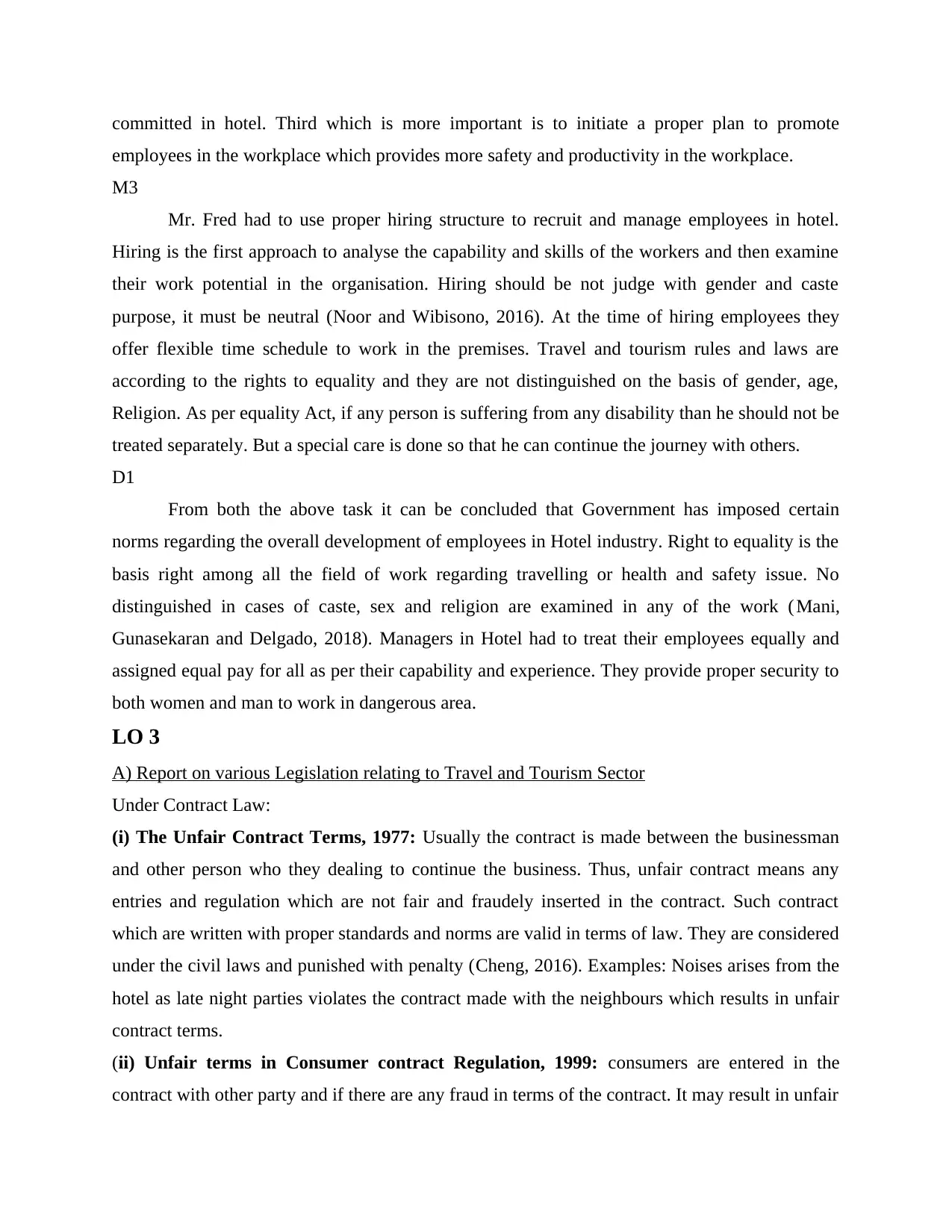
committed in hotel. Third which is more important is to initiate a proper plan to promote
employees in the workplace which provides more safety and productivity in the workplace.
M3
Mr. Fred had to use proper hiring structure to recruit and manage employees in hotel.
Hiring is the first approach to analyse the capability and skills of the workers and then examine
their work potential in the organisation. Hiring should be not judge with gender and caste
purpose, it must be neutral (Noor and Wibisono, 2016). At the time of hiring employees they
offer flexible time schedule to work in the premises. Travel and tourism rules and laws are
according to the rights to equality and they are not distinguished on the basis of gender, age,
Religion. As per equality Act, if any person is suffering from any disability than he should not be
treated separately. But a special care is done so that he can continue the journey with others.
D1
From both the above task it can be concluded that Government has imposed certain
norms regarding the overall development of employees in Hotel industry. Right to equality is the
basis right among all the field of work regarding travelling or health and safety issue. No
distinguished in cases of caste, sex and religion are examined in any of the work ( Mani,
Gunasekaran and Delgado, 2018). Managers in Hotel had to treat their employees equally and
assigned equal pay for all as per their capability and experience. They provide proper security to
both women and man to work in dangerous area.
LO 3
A) Report on various Legislation relating to Travel and Tourism Sector
Under Contract Law:
(i) The Unfair Contract Terms, 1977: Usually the contract is made between the businessman
and other person who they dealing to continue the business. Thus, unfair contract means any
entries and regulation which are not fair and fraudely inserted in the contract. Such contract
which are written with proper standards and norms are valid in terms of law. They are considered
under the civil laws and punished with penalty (Cheng, 2016). Examples: Noises arises from the
hotel as late night parties violates the contract made with the neighbours which results in unfair
contract terms.
(ii) Unfair terms in Consumer contract Regulation, 1999: consumers are entered in the
contract with other party and if there are any fraud in terms of the contract. It may result in unfair
employees in the workplace which provides more safety and productivity in the workplace.
M3
Mr. Fred had to use proper hiring structure to recruit and manage employees in hotel.
Hiring is the first approach to analyse the capability and skills of the workers and then examine
their work potential in the organisation. Hiring should be not judge with gender and caste
purpose, it must be neutral (Noor and Wibisono, 2016). At the time of hiring employees they
offer flexible time schedule to work in the premises. Travel and tourism rules and laws are
according to the rights to equality and they are not distinguished on the basis of gender, age,
Religion. As per equality Act, if any person is suffering from any disability than he should not be
treated separately. But a special care is done so that he can continue the journey with others.
D1
From both the above task it can be concluded that Government has imposed certain
norms regarding the overall development of employees in Hotel industry. Right to equality is the
basis right among all the field of work regarding travelling or health and safety issue. No
distinguished in cases of caste, sex and religion are examined in any of the work ( Mani,
Gunasekaran and Delgado, 2018). Managers in Hotel had to treat their employees equally and
assigned equal pay for all as per their capability and experience. They provide proper security to
both women and man to work in dangerous area.
LO 3
A) Report on various Legislation relating to Travel and Tourism Sector
Under Contract Law:
(i) The Unfair Contract Terms, 1977: Usually the contract is made between the businessman
and other person who they dealing to continue the business. Thus, unfair contract means any
entries and regulation which are not fair and fraudely inserted in the contract. Such contract
which are written with proper standards and norms are valid in terms of law. They are considered
under the civil laws and punished with penalty (Cheng, 2016). Examples: Noises arises from the
hotel as late night parties violates the contract made with the neighbours which results in unfair
contract terms.
(ii) Unfair terms in Consumer contract Regulation, 1999: consumers are entered in the
contract with other party and if there are any fraud in terms of the contract. It may result in unfair
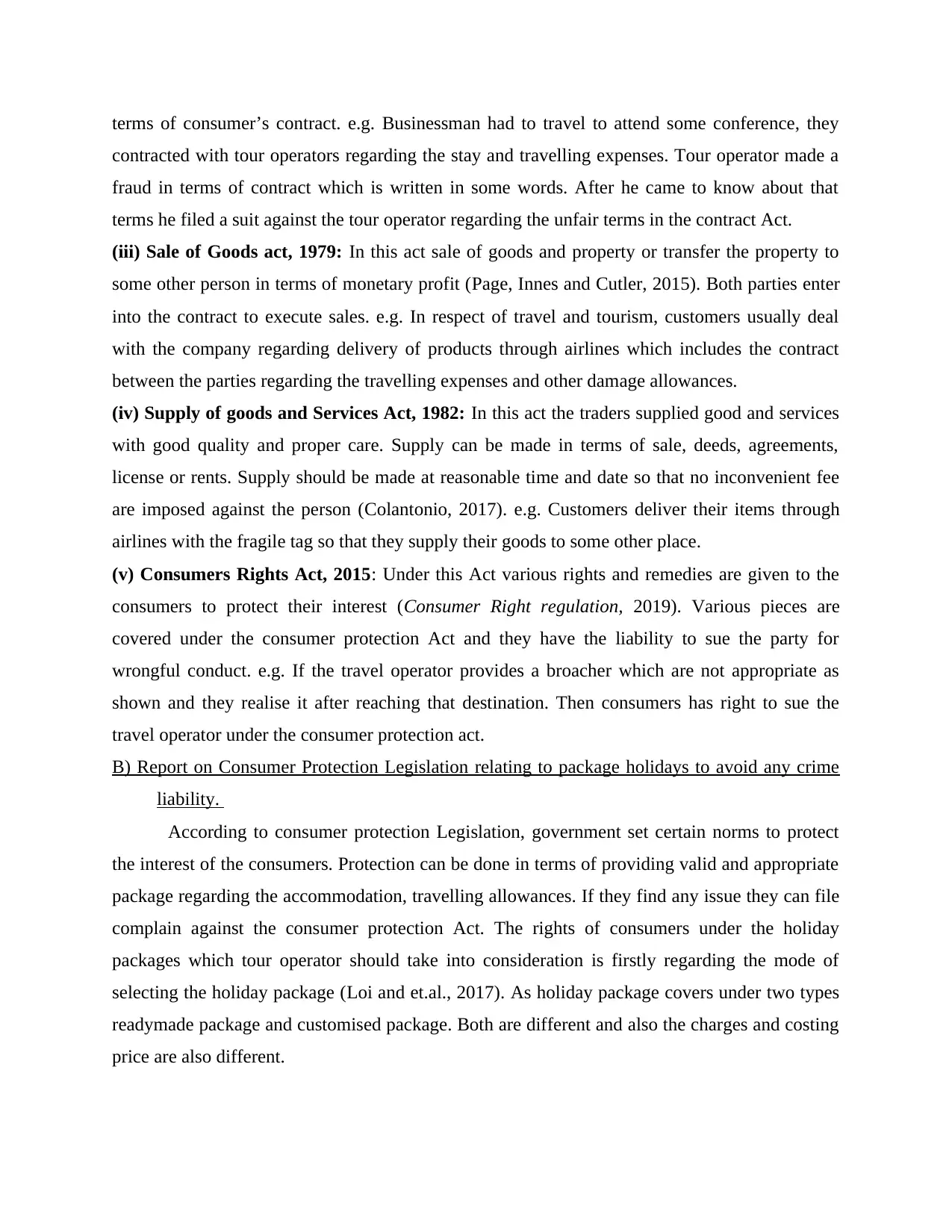
terms of consumer’s contract. e.g. Businessman had to travel to attend some conference, they
contracted with tour operators regarding the stay and travelling expenses. Tour operator made a
fraud in terms of contract which is written in some words. After he came to know about that
terms he filed a suit against the tour operator regarding the unfair terms in the contract Act.
(iii) Sale of Goods act, 1979: In this act sale of goods and property or transfer the property to
some other person in terms of monetary profit (Page, Innes and Cutler, 2015). Both parties enter
into the contract to execute sales. e.g. In respect of travel and tourism, customers usually deal
with the company regarding delivery of products through airlines which includes the contract
between the parties regarding the travelling expenses and other damage allowances.
(iv) Supply of goods and Services Act, 1982: In this act the traders supplied good and services
with good quality and proper care. Supply can be made in terms of sale, deeds, agreements,
license or rents. Supply should be made at reasonable time and date so that no inconvenient fee
are imposed against the person (Colantonio, 2017). e.g. Customers deliver their items through
airlines with the fragile tag so that they supply their goods to some other place.
(v) Consumers Rights Act, 2015: Under this Act various rights and remedies are given to the
consumers to protect their interest (Consumer Right regulation, 2019). Various pieces are
covered under the consumer protection Act and they have the liability to sue the party for
wrongful conduct. e.g. If the travel operator provides a broacher which are not appropriate as
shown and they realise it after reaching that destination. Then consumers has right to sue the
travel operator under the consumer protection act.
B) Report on Consumer Protection Legislation relating to package holidays to avoid any crime
liability.
According to consumer protection Legislation, government set certain norms to protect
the interest of the consumers. Protection can be done in terms of providing valid and appropriate
package regarding the accommodation, travelling allowances. If they find any issue they can file
complain against the consumer protection Act. The rights of consumers under the holiday
packages which tour operator should take into consideration is firstly regarding the mode of
selecting the holiday package (Loi and et.al., 2017). As holiday package covers under two types
readymade package and customised package. Both are different and also the charges and costing
price are also different.
contracted with tour operators regarding the stay and travelling expenses. Tour operator made a
fraud in terms of contract which is written in some words. After he came to know about that
terms he filed a suit against the tour operator regarding the unfair terms in the contract Act.
(iii) Sale of Goods act, 1979: In this act sale of goods and property or transfer the property to
some other person in terms of monetary profit (Page, Innes and Cutler, 2015). Both parties enter
into the contract to execute sales. e.g. In respect of travel and tourism, customers usually deal
with the company regarding delivery of products through airlines which includes the contract
between the parties regarding the travelling expenses and other damage allowances.
(iv) Supply of goods and Services Act, 1982: In this act the traders supplied good and services
with good quality and proper care. Supply can be made in terms of sale, deeds, agreements,
license or rents. Supply should be made at reasonable time and date so that no inconvenient fee
are imposed against the person (Colantonio, 2017). e.g. Customers deliver their items through
airlines with the fragile tag so that they supply their goods to some other place.
(v) Consumers Rights Act, 2015: Under this Act various rights and remedies are given to the
consumers to protect their interest (Consumer Right regulation, 2019). Various pieces are
covered under the consumer protection Act and they have the liability to sue the party for
wrongful conduct. e.g. If the travel operator provides a broacher which are not appropriate as
shown and they realise it after reaching that destination. Then consumers has right to sue the
travel operator under the consumer protection act.
B) Report on Consumer Protection Legislation relating to package holidays to avoid any crime
liability.
According to consumer protection Legislation, government set certain norms to protect
the interest of the consumers. Protection can be done in terms of providing valid and appropriate
package regarding the accommodation, travelling allowances. If they find any issue they can file
complain against the consumer protection Act. The rights of consumers under the holiday
packages which tour operator should take into consideration is firstly regarding the mode of
selecting the holiday package (Loi and et.al., 2017). As holiday package covers under two types
readymade package and customised package. Both are different and also the charges and costing
price are also different.
⊘ This is a preview!⊘
Do you want full access?
Subscribe today to unlock all pages.

Trusted by 1+ million students worldwide
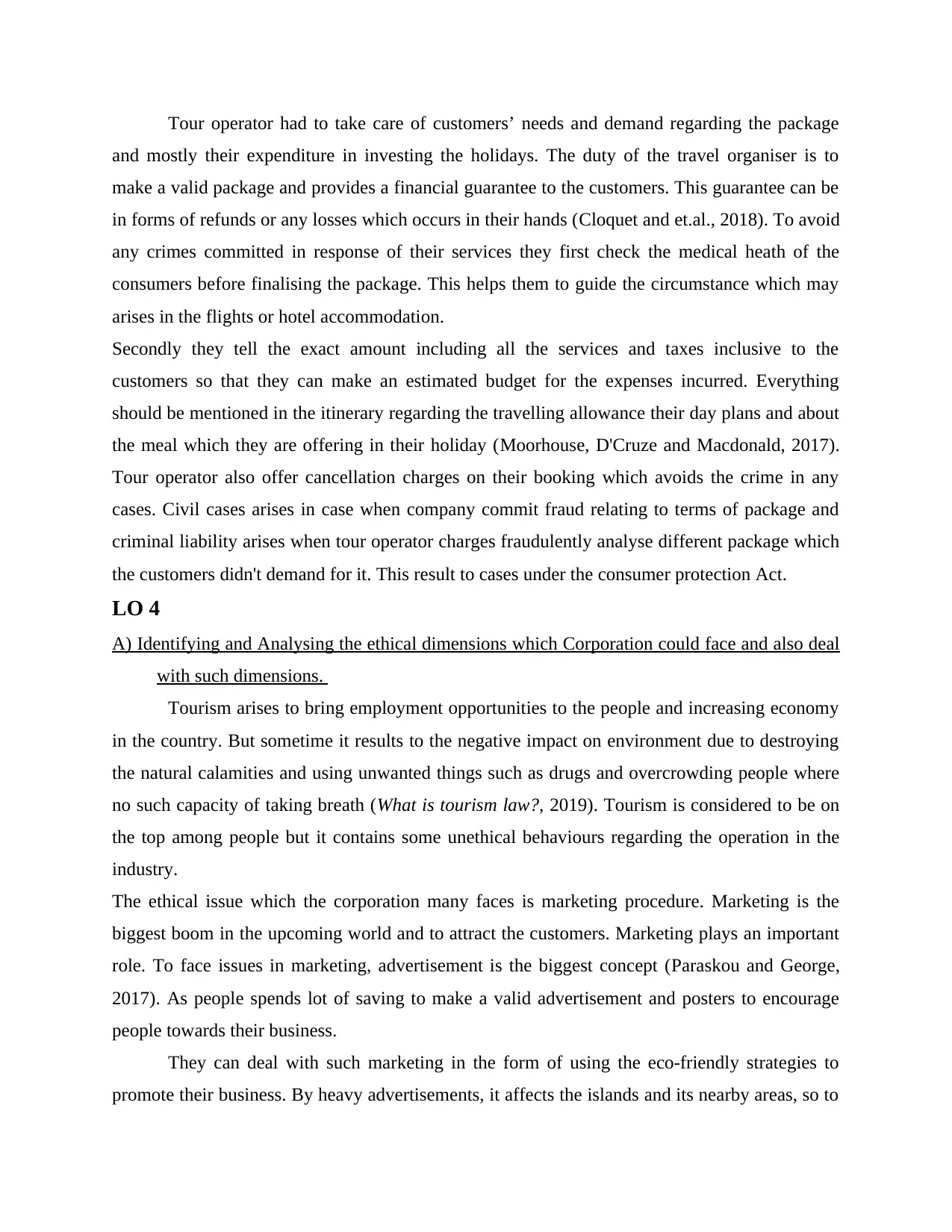
Tour operator had to take care of customers’ needs and demand regarding the package
and mostly their expenditure in investing the holidays. The duty of the travel organiser is to
make a valid package and provides a financial guarantee to the customers. This guarantee can be
in forms of refunds or any losses which occurs in their hands (Cloquet and et.al., 2018). To avoid
any crimes committed in response of their services they first check the medical heath of the
consumers before finalising the package. This helps them to guide the circumstance which may
arises in the flights or hotel accommodation.
Secondly they tell the exact amount including all the services and taxes inclusive to the
customers so that they can make an estimated budget for the expenses incurred. Everything
should be mentioned in the itinerary regarding the travelling allowance their day plans and about
the meal which they are offering in their holiday (Moorhouse, D'Cruze and Macdonald, 2017).
Tour operator also offer cancellation charges on their booking which avoids the crime in any
cases. Civil cases arises in case when company commit fraud relating to terms of package and
criminal liability arises when tour operator charges fraudulently analyse different package which
the customers didn't demand for it. This result to cases under the consumer protection Act.
LO 4
A) Identifying and Analysing the ethical dimensions which Corporation could face and also deal
with such dimensions.
Tourism arises to bring employment opportunities to the people and increasing economy
in the country. But sometime it results to the negative impact on environment due to destroying
the natural calamities and using unwanted things such as drugs and overcrowding people where
no such capacity of taking breath (What is tourism law?, 2019). Tourism is considered to be on
the top among people but it contains some unethical behaviours regarding the operation in the
industry.
The ethical issue which the corporation many faces is marketing procedure. Marketing is the
biggest boom in the upcoming world and to attract the customers. Marketing plays an important
role. To face issues in marketing, advertisement is the biggest concept (Paraskou and George,
2017). As people spends lot of saving to make a valid advertisement and posters to encourage
people towards their business.
They can deal with such marketing in the form of using the eco-friendly strategies to
promote their business. By heavy advertisements, it affects the islands and its nearby areas, so to
and mostly their expenditure in investing the holidays. The duty of the travel organiser is to
make a valid package and provides a financial guarantee to the customers. This guarantee can be
in forms of refunds or any losses which occurs in their hands (Cloquet and et.al., 2018). To avoid
any crimes committed in response of their services they first check the medical heath of the
consumers before finalising the package. This helps them to guide the circumstance which may
arises in the flights or hotel accommodation.
Secondly they tell the exact amount including all the services and taxes inclusive to the
customers so that they can make an estimated budget for the expenses incurred. Everything
should be mentioned in the itinerary regarding the travelling allowance their day plans and about
the meal which they are offering in their holiday (Moorhouse, D'Cruze and Macdonald, 2017).
Tour operator also offer cancellation charges on their booking which avoids the crime in any
cases. Civil cases arises in case when company commit fraud relating to terms of package and
criminal liability arises when tour operator charges fraudulently analyse different package which
the customers didn't demand for it. This result to cases under the consumer protection Act.
LO 4
A) Identifying and Analysing the ethical dimensions which Corporation could face and also deal
with such dimensions.
Tourism arises to bring employment opportunities to the people and increasing economy
in the country. But sometime it results to the negative impact on environment due to destroying
the natural calamities and using unwanted things such as drugs and overcrowding people where
no such capacity of taking breath (What is tourism law?, 2019). Tourism is considered to be on
the top among people but it contains some unethical behaviours regarding the operation in the
industry.
The ethical issue which the corporation many faces is marketing procedure. Marketing is the
biggest boom in the upcoming world and to attract the customers. Marketing plays an important
role. To face issues in marketing, advertisement is the biggest concept (Paraskou and George,
2017). As people spends lot of saving to make a valid advertisement and posters to encourage
people towards their business.
They can deal with such marketing in the form of using the eco-friendly strategies to
promote their business. By heavy advertisements, it affects the islands and its nearby areas, so to
Paraphrase This Document
Need a fresh take? Get an instant paraphrase of this document with our AI Paraphraser
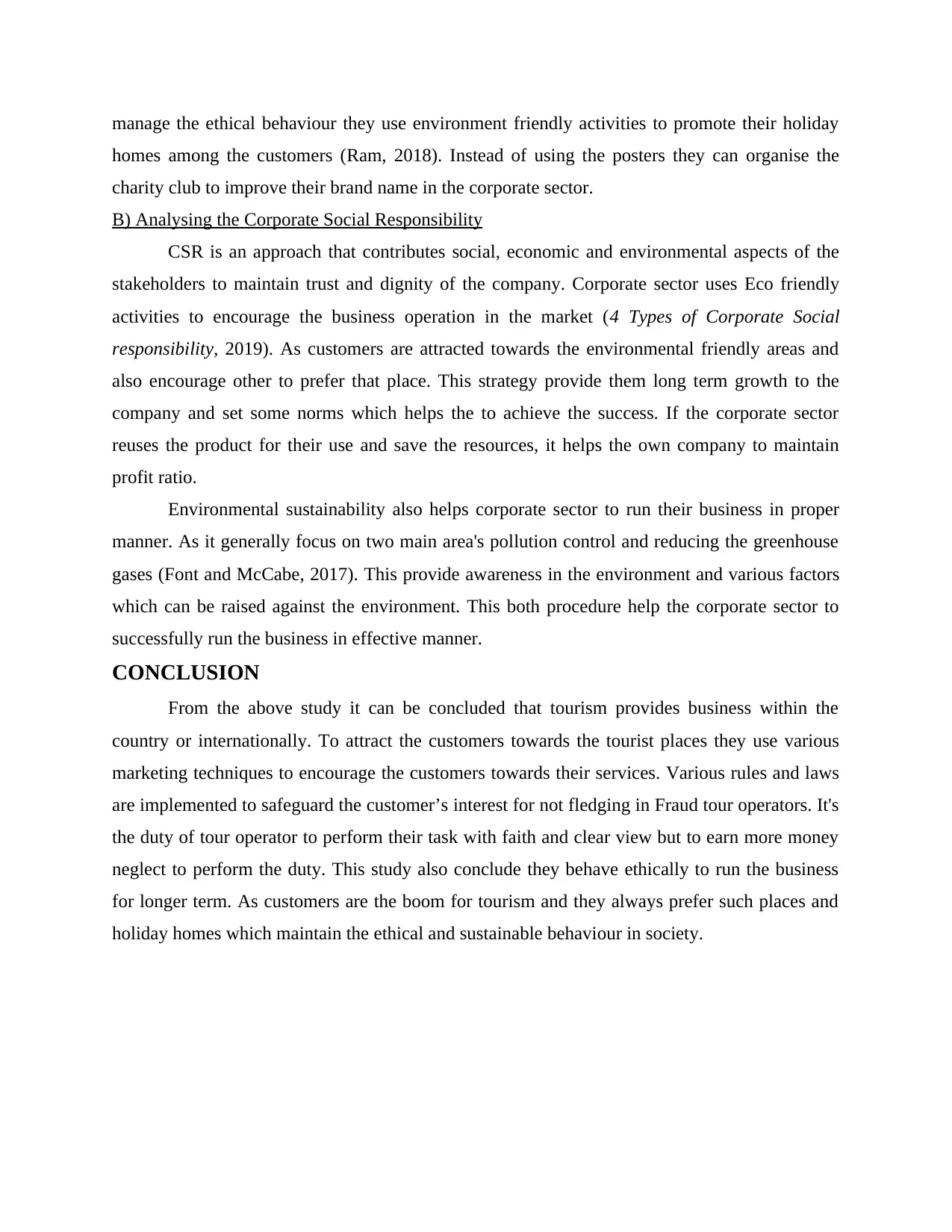
manage the ethical behaviour they use environment friendly activities to promote their holiday
homes among the customers (Ram, 2018). Instead of using the posters they can organise the
charity club to improve their brand name in the corporate sector.
B) Analysing the Corporate Social Responsibility
CSR is an approach that contributes social, economic and environmental aspects of the
stakeholders to maintain trust and dignity of the company. Corporate sector uses Eco friendly
activities to encourage the business operation in the market (4 Types of Corporate Social
responsibility, 2019). As customers are attracted towards the environmental friendly areas and
also encourage other to prefer that place. This strategy provide them long term growth to the
company and set some norms which helps the to achieve the success. If the corporate sector
reuses the product for their use and save the resources, it helps the own company to maintain
profit ratio.
Environmental sustainability also helps corporate sector to run their business in proper
manner. As it generally focus on two main area's pollution control and reducing the greenhouse
gases (Font and McCabe, 2017). This provide awareness in the environment and various factors
which can be raised against the environment. This both procedure help the corporate sector to
successfully run the business in effective manner.
CONCLUSION
From the above study it can be concluded that tourism provides business within the
country or internationally. To attract the customers towards the tourist places they use various
marketing techniques to encourage the customers towards their services. Various rules and laws
are implemented to safeguard the customer’s interest for not fledging in Fraud tour operators. It's
the duty of tour operator to perform their task with faith and clear view but to earn more money
neglect to perform the duty. This study also conclude they behave ethically to run the business
for longer term. As customers are the boom for tourism and they always prefer such places and
holiday homes which maintain the ethical and sustainable behaviour in society.
homes among the customers (Ram, 2018). Instead of using the posters they can organise the
charity club to improve their brand name in the corporate sector.
B) Analysing the Corporate Social Responsibility
CSR is an approach that contributes social, economic and environmental aspects of the
stakeholders to maintain trust and dignity of the company. Corporate sector uses Eco friendly
activities to encourage the business operation in the market (4 Types of Corporate Social
responsibility, 2019). As customers are attracted towards the environmental friendly areas and
also encourage other to prefer that place. This strategy provide them long term growth to the
company and set some norms which helps the to achieve the success. If the corporate sector
reuses the product for their use and save the resources, it helps the own company to maintain
profit ratio.
Environmental sustainability also helps corporate sector to run their business in proper
manner. As it generally focus on two main area's pollution control and reducing the greenhouse
gases (Font and McCabe, 2017). This provide awareness in the environment and various factors
which can be raised against the environment. This both procedure help the corporate sector to
successfully run the business in effective manner.
CONCLUSION
From the above study it can be concluded that tourism provides business within the
country or internationally. To attract the customers towards the tourist places they use various
marketing techniques to encourage the customers towards their services. Various rules and laws
are implemented to safeguard the customer’s interest for not fledging in Fraud tour operators. It's
the duty of tour operator to perform their task with faith and clear view but to earn more money
neglect to perform the duty. This study also conclude they behave ethically to run the business
for longer term. As customers are the boom for tourism and they always prefer such places and
holiday homes which maintain the ethical and sustainable behaviour in society.
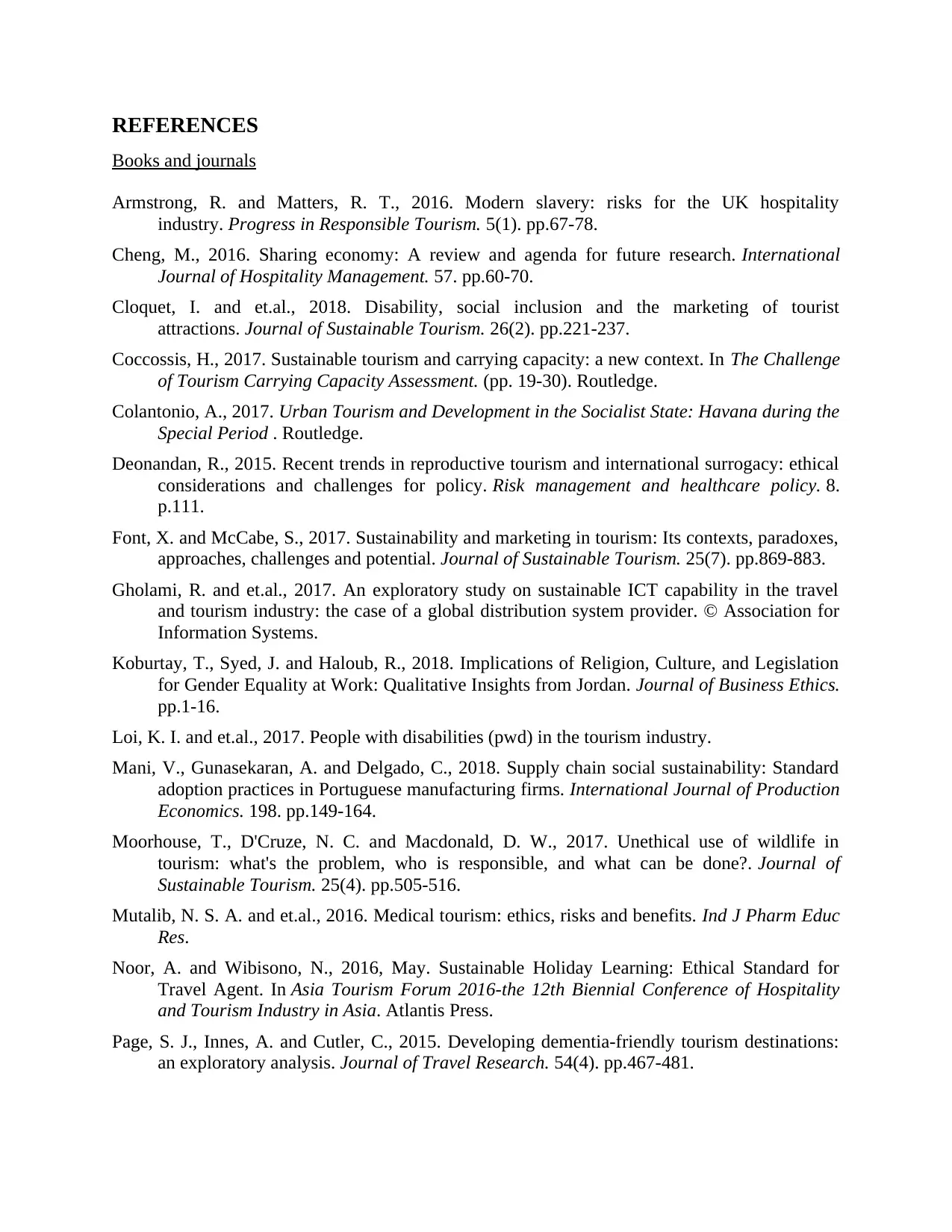
REFERENCES
Books and journals
Armstrong, R. and Matters, R. T., 2016. Modern slavery: risks for the UK hospitality
industry. Progress in Responsible Tourism. 5(1). pp.67-78.
Cheng, M., 2016. Sharing economy: A review and agenda for future research. International
Journal of Hospitality Management. 57. pp.60-70.
Cloquet, I. and et.al., 2018. Disability, social inclusion and the marketing of tourist
attractions. Journal of Sustainable Tourism. 26(2). pp.221-237.
Coccossis, H., 2017. Sustainable tourism and carrying capacity: a new context. In The Challenge
of Tourism Carrying Capacity Assessment. (pp. 19-30). Routledge.
Colantonio, A., 2017. Urban Tourism and Development in the Socialist State: Havana during the
Special Period . Routledge.
Deonandan, R., 2015. Recent trends in reproductive tourism and international surrogacy: ethical
considerations and challenges for policy. Risk management and healthcare policy. 8.
p.111.
Font, X. and McCabe, S., 2017. Sustainability and marketing in tourism: Its contexts, paradoxes,
approaches, challenges and potential. Journal of Sustainable Tourism. 25(7). pp.869-883.
Gholami, R. and et.al., 2017. An exploratory study on sustainable ICT capability in the travel
and tourism industry: the case of a global distribution system provider. © Association for
Information Systems.
Koburtay, T., Syed, J. and Haloub, R., 2018. Implications of Religion, Culture, and Legislation
for Gender Equality at Work: Qualitative Insights from Jordan. Journal of Business Ethics.
pp.1-16.
Loi, K. I. and et.al., 2017. People with disabilities (pwd) in the tourism industry.
Mani, V., Gunasekaran, A. and Delgado, C., 2018. Supply chain social sustainability: Standard
adoption practices in Portuguese manufacturing firms. International Journal of Production
Economics. 198. pp.149-164.
Moorhouse, T., D'Cruze, N. C. and Macdonald, D. W., 2017. Unethical use of wildlife in
tourism: what's the problem, who is responsible, and what can be done?. Journal of
Sustainable Tourism. 25(4). pp.505-516.
Mutalib, N. S. A. and et.al., 2016. Medical tourism: ethics, risks and benefits. Ind J Pharm Educ
Res.
Noor, A. and Wibisono, N., 2016, May. Sustainable Holiday Learning: Ethical Standard for
Travel Agent. In Asia Tourism Forum 2016-the 12th Biennial Conference of Hospitality
and Tourism Industry in Asia. Atlantis Press.
Page, S. J., Innes, A. and Cutler, C., 2015. Developing dementia-friendly tourism destinations:
an exploratory analysis. Journal of Travel Research. 54(4). pp.467-481.
Books and journals
Armstrong, R. and Matters, R. T., 2016. Modern slavery: risks for the UK hospitality
industry. Progress in Responsible Tourism. 5(1). pp.67-78.
Cheng, M., 2016. Sharing economy: A review and agenda for future research. International
Journal of Hospitality Management. 57. pp.60-70.
Cloquet, I. and et.al., 2018. Disability, social inclusion and the marketing of tourist
attractions. Journal of Sustainable Tourism. 26(2). pp.221-237.
Coccossis, H., 2017. Sustainable tourism and carrying capacity: a new context. In The Challenge
of Tourism Carrying Capacity Assessment. (pp. 19-30). Routledge.
Colantonio, A., 2017. Urban Tourism and Development in the Socialist State: Havana during the
Special Period . Routledge.
Deonandan, R., 2015. Recent trends in reproductive tourism and international surrogacy: ethical
considerations and challenges for policy. Risk management and healthcare policy. 8.
p.111.
Font, X. and McCabe, S., 2017. Sustainability and marketing in tourism: Its contexts, paradoxes,
approaches, challenges and potential. Journal of Sustainable Tourism. 25(7). pp.869-883.
Gholami, R. and et.al., 2017. An exploratory study on sustainable ICT capability in the travel
and tourism industry: the case of a global distribution system provider. © Association for
Information Systems.
Koburtay, T., Syed, J. and Haloub, R., 2018. Implications of Religion, Culture, and Legislation
for Gender Equality at Work: Qualitative Insights from Jordan. Journal of Business Ethics.
pp.1-16.
Loi, K. I. and et.al., 2017. People with disabilities (pwd) in the tourism industry.
Mani, V., Gunasekaran, A. and Delgado, C., 2018. Supply chain social sustainability: Standard
adoption practices in Portuguese manufacturing firms. International Journal of Production
Economics. 198. pp.149-164.
Moorhouse, T., D'Cruze, N. C. and Macdonald, D. W., 2017. Unethical use of wildlife in
tourism: what's the problem, who is responsible, and what can be done?. Journal of
Sustainable Tourism. 25(4). pp.505-516.
Mutalib, N. S. A. and et.al., 2016. Medical tourism: ethics, risks and benefits. Ind J Pharm Educ
Res.
Noor, A. and Wibisono, N., 2016, May. Sustainable Holiday Learning: Ethical Standard for
Travel Agent. In Asia Tourism Forum 2016-the 12th Biennial Conference of Hospitality
and Tourism Industry in Asia. Atlantis Press.
Page, S. J., Innes, A. and Cutler, C., 2015. Developing dementia-friendly tourism destinations:
an exploratory analysis. Journal of Travel Research. 54(4). pp.467-481.
⊘ This is a preview!⊘
Do you want full access?
Subscribe today to unlock all pages.

Trusted by 1+ million students worldwide
1 out of 13
Related Documents
Your All-in-One AI-Powered Toolkit for Academic Success.
+13062052269
info@desklib.com
Available 24*7 on WhatsApp / Email
![[object Object]](/_next/static/media/star-bottom.7253800d.svg)
Unlock your academic potential
Copyright © 2020–2026 A2Z Services. All Rights Reserved. Developed and managed by ZUCOL.




